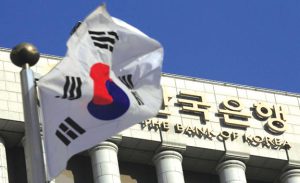Bloomberg
The Bank of Korea (BOK) added to a wave of global action against inflation this week by raising its key interest rate, brushing aside concerns about a leadership vacuum at the bank and global risks to the export-dependent economy.
The central bank raised its seven-day repurchase rate by a quarter percentage point to 1.5% in the board’s first-ever decision without a governor in place. Some 11 economists surveyed by Bloomberg had expected the hike, while 10 forecast policy would remain unchanged.
While the BOK warned that the economy would grow less than previously forecast this year, the decision highlights the more pressing sense of urgency among policy makers to tackle inflation fuelled by the war in Ukraine. The bank last week warned it’s likely to remain in a 4% range for the foreseeable future.
“Big changes have happened since the February meeting,†Joo Sang-yong, acting chairman of the policy committee, said at a press briefing after the decision. “We concluded the existing inflationary pressures could go on for longer than expected due to the Ukraine situation. So despite the vacancy of the governor position, we had no choice but to respond.â€
South Korean bonds rallied, with the yield on the nation’s three-year bond falling as much as 10 basis points to 2.9%, as uncertainties over the central bank’s policy path eased. The South Korean won was little changed, up 0.2% to 1,224.65 per dollar.
Central banks worldwide are struggling to cool consumer prices fuelled by pandemic-era stimulus and exacerbated by the Russia’s invasion of Ukraine.
Meantime, Federal Reserve policy makers have signaled they could move in half-point steps if needed, starting when they next meet in early May.
The BOK’s decision should be seen as a pre-emptive step in light of higher-than-expected inflation, consumer-price concerns among the presidential transition committee, the large hikes in New Zealand and Canada and the strong possibility of the Fed following them, said Cho Yong-gu, a fixed-income strategist at Shinyoung Securities.
“Realistically speaking, this paves the way for a maximum of two more hikes by the end of the third quarter,†Cho said, raising the chance of the rate reaching 2.25% by year-end.
The BOK already raised rates three times between August and January to tackle soaring asset prices and inflation, before standing pat in former Governor Lee Ju-yeol’s final meeting in February.
The nominated new Governor Rhee Chang-yong has made clear he sees inflation as a pressing concern ahead of a parliamentary hearing on April 19. Assuming Rhee is confirmed in the role, as is widely expected, he may continue with the push toward normalization, starting as early as the next policy meeting on May 26.
The unanimous decision to raise rates even in the absence of a governor, suggests Rhee doesn’t face any immediate opposition to continuing along a tightening path.
“I think Rhee may not differ too much from Lee in the monetary policy handling at this point though he may be perceived to be less hawkish,†said Ho Woei Chen, an economist at United Overseas Bank Ltd. in Singapore, before the decision.
 The Gulf Time Newspaper One of the finest business newspapers in the UAE brought to you by our professional writers and editors.
The Gulf Time Newspaper One of the finest business newspapers in the UAE brought to you by our professional writers and editors.
